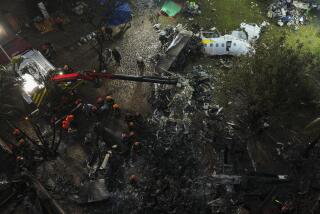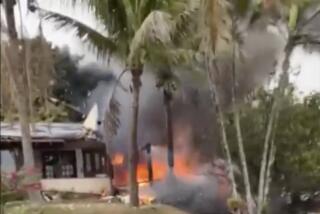Transcripts detail the final moments of flight from Rio
- Share via
PARIS — The pilots aboard the doomed Air France passenger jet that plunged into the Atlantic two years ago knew they were going to crash only seconds before they hit the water, according to transcripts of their exchanges recently published for the first time.
“We’re going to crash,” says one copilot of Flight 447, which went down en route from Rio de Janeiro to Paris. “It’s not true!”
“But what’s happening?” asks the second copilot.
Less than three seconds later, the recording stops as the plane crashes, killing all 228 passengers and crew members on board.
The exchanges, published in a book by a veteran French flying instructor, reveal that in the four minutes and 24 seconds it took the aircraft to drop out of the night sky during a tropical storm, the pilots were confused and appeared to have no idea what was happening or what to do to save the plane.
During those minutes, the “stall” warning sounded 75 times, according to the transcripts.
Air accident investigators have been able to piece together the final moments of the June 2009 flight from the data recorders recovered in May after a two-year search.
Until now, only part of the conversation among Marc Dubois, 58, the captain and the most experienced pilot, and his copilots, David Robert, 37, and Pierre-Cedric Bonin, 32, had been published out of respect for the men’s families.
But in the new book “Piloting Errors, Volume 5,” flying instructor Jean-Pierre Otelli gives a detailed transcript of the flight’s final minutes.
“I no longer have control of the plane. I no longer have control of the plane,” Bonin says as the aircraft stalls.
“What’s happening?” Robert asks. “What’s that?”
“I think we have speed!” Bonin replies as the aircraft is falling faster and faster.
The book reveals that two hours and 10 minutes into the flight, an alarm sounded indicating that the plane’s autopilot had disconnected. It is at this point that the plane’s speed sensors are thought to have iced up momentarily, sending conflicting signals to the crew.
At the time the captain was on a routine sleep break, and the most inexperienced pilot, Bonin, who had 2,900 hours of flight experience, was controlling the plane.
Despite the stall warnings, Bonin pulled the plane’s nose up, eventually causing it to stall. Otelli writes that it was the opposite of what he should have done.
“At this point, the pilot should have pushed hard on the control stick, but [Bonin] did exactly the opposite. He pulled.... It’s an instinctive reaction we find among numerous young students during their first training on stalls,” Otelli writes.
In the final moments of the flight, he concludes, crew members entered a fatal “vicious circle.” The more they pulled the plane up, the faster it fell; the faster it fell, the more they tried to pull the plane up.
The second copilot, Robert, apparently realized what was happening and tried to push the nose of the aircraft down, but it was too late.
“This accident, and the mystery surrounding it, elicited huge emotion in France as well as in Brazil,” Otelli writes. “Beyond the questions raised about modern air safety and pilot training, the crash of the Rio-Paris flight will remain a case study in the annals of air transport.”
Air France and the plane’s maker, Airbus -- both under investigation for manslaughter -- have conflicting interests in whether the cause of the accident is declared pilot error or technical failure. Both companies deny the manslaughter charge.
The BEA, the French air investigation bureau, described the publication of the conversations as a “lack of respect for the memory of the crew who died,” adding that it would “poison the controversy that has been going on for several months and is damaging to all.”
Airbus spokesman Stefan Schaffrath told French journalists there was nothing new in the book. “It reflects what has already been published by the BEA,” he said in a statement.
Air France has always said that there was “maximum competence in the cockpit.”
--
Willsher is a special correspondent.
More to Read
Sign up for Essential California
The most important California stories and recommendations in your inbox every morning.
You may occasionally receive promotional content from the Los Angeles Times.













